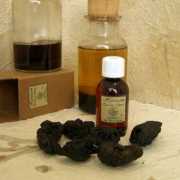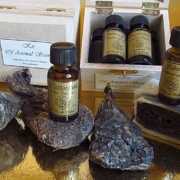Goat Hair Tincture and Human Pheromones
Time ago I received two samples of goat musk from Gayla of the Always Enough Ranch in California where she breeds goats. She wrote:
” I know they have musk glands behind their horns, but I believe they exude musk through their urine too. They pee on their faces to perfume themselves. And on their legs, and on their bellies… And every inch gets somehow perfumed.”
She collected the perfume very simply by rubbing the goat in the two places mentioned with cotton wool.
After tincturing, I can see a huge difference between the two. The substance collected from the head has the typical smell of goat and goat cheese while the hind leg substance is very much more like muskdeer, a very sexy smell almost without the goat smell.
In fact, most mammals spread their pheromones through the urine because very few possess a specific organ to produce them like beaver or civet. The heavy non-flying and often non-smelling primary pheromone molecules are digested and tailored by the bacteria of the skin and take their smell and assume their pheromonal function only after this process (it consists in separating the acids from the proteins to which they are bound at the time of their production. Like human armpits sweat. In this process, the hairs are very important and this is the real reason for their presence in these parts of our body. They increase the living space of the micro-organisms and the evaporating surface of the smell. Shaving armpits hairs drastically reduces the efficiency of the “armpit organ”.
The use of perfumes is common in all civilizations. It has the aim to eliminate body smells (because they are bactericides) but also to “spiritualize” the proper individual animal scent which remains anyway. Another instrument that is common to many civilizations is the shaving of armpit and pubic hair, practiced to our days in the whole of Africa, in all the Muslim world, and in the Hebrew culture.
To come to a conclusion it seems strange that on one side the civilized person washes away his animal scent but prefers perfumes that contain Castoreum or Civet as an endeavor to appropriate an animal scent. I still conclude that it is a question of vital force that all-natural aromatic molecules contain (in Arabic the essence is called Ruh; the spirit of the plant). So in the search for the vital energy present in the perfume, we prefer those that contain botanical and animal spirits.





















Leave a Reply
Want to join the discussion?Feel free to contribute!